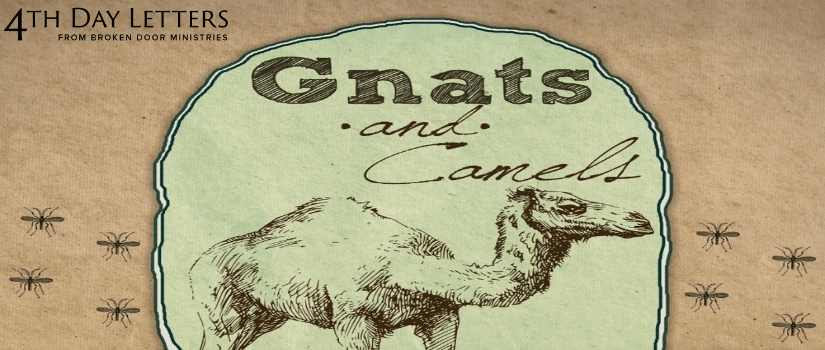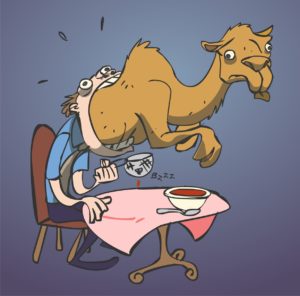
STRAINING GNATS—SWALLOWING CAMELS
Does this happen to you? No matter how many times I have read a particular Bible passage, sometimes the Holy Spirit causes a specific verse to just jump out and speak to me. That is what happened this week. Today I want to share my thoughts on one specific verse, that in the past I must have overlooked. That verse is: “Blind guides, who strain out the gnat and swallow the camel!” I can see direct applicability to this in my own life. Was Jesus perhaps speaking these words to you too?
There were clearly times when Jesus became exasperated with the Pharisees. One of those encounters is well documented in Matthew 23:1-36. The entire passage captures Jesus putting the scribes and Pharisees in their place. These men were good at being holy on small things that didn’t really matter much while completely missing the big point on weightier issues. Have you ever done that? I have!
 You see, the Pharisees were very conscientious to follow their stringent dietary rules. If a gnat were to land in their soup, they would strain their soup so as to not become unclean. Gnats were deemed to be an unclean insect and therefore to consume one would make them unclean as well.
You see, the Pharisees were very conscientious to follow their stringent dietary rules. If a gnat were to land in their soup, they would strain their soup so as to not become unclean. Gnats were deemed to be an unclean insect and therefore to consume one would make them unclean as well.
Camels were also seen as unclean animals. Immensely bigger than a gnat, if one were going to consume something unclean, eating a gnat would surely be less egregious than eating a camel. Even though the Pharisees had mastered their less-meaningful dietary rules they would routinely treat others with a lack of justice, mercy, patience or forgiveness. In other words, they were grossly ignoring one of God’s far more important rules.
 You and I might go to church every Sunday, say our prayers daily, tithe our income, and then speak poorly behind someone’s back, gossip, or turn our back on those in need all around us. When we do these things we are straining gnats and eating camels.
You and I might go to church every Sunday, say our prayers daily, tithe our income, and then speak poorly behind someone’s back, gossip, or turn our back on those in need all around us. When we do these things we are straining gnats and eating camels.
As Christians, sometimes we reserve our worst behavior for the ways we treat or speak about other members of our church or even the way we treat or speak about our priests and pastors. Have you spoken about another member of your church community or your pastor behind their back? Have you grumbled about some change of tradition in your worship service? Have you ever written a note to your pastor about some change taking place and your written words were less than Christ-like? If so, how did that camel taste?
Permit me to interject a little humor in this otherwise serious topic. When I think about someone grumbling about a change in tradition I can’t help but remember the time I was in the play Fiddler On A Roof at our civic theater. In the opening song, Tevye sings this: “Here in Anatevka we have traditions for everything: how to eat, how to sleep, how to wear our clothes. For instance, we always keep our heads covered and always wear a little prayer shawl… This shows our constant devotion to God. You may ask, how did this tradition start. I’ll tell you… I don’t know.” Reread that last sentence. Sometimes we hold tightly to traditions that we don’t even know the meaning of, yet we object to anyone wanting to change these things.
Whether we are Protestant, Catholic or a member of a non-denominational church we all have many traditions. Over time some old traditions naturally need to change. I am not talking about matters of faith, I am talking about minor (gnat –like) aspects of the way we worship. As an example, my parish recently installed two large screens at the front right and left sides of our church to project information on. These could be used to project announcements prior to mass, lyrics for songs rather than using hymnals, or videos after mass about some interesting ministry activity in our parish. Even though these screens have yet to be used, everyone has an opinion about this change. Some people might be inclined to share their views in a less than Christ-like way.
Don’t get caught up (make a mountain out of a mole hill) on my one example. I have a bigger point to make. When it comes to issues concerning our church or someone in our church, we can often act in a Pharisee-like fashion. Here again we are straining out gnats and swallowing camels.
 Pharisees are long gone, but today there are still vestiges of their actions alive and well in all of us. It is so easy to go through the motions of following the rules of our faith and yet have our hearts far away from God. Does Jesus need to rebuke us like He rebuked the Pharisees in Mathew’s Gospel?
Pharisees are long gone, but today there are still vestiges of their actions alive and well in all of us. It is so easy to go through the motions of following the rules of our faith and yet have our hearts far away from God. Does Jesus need to rebuke us like He rebuked the Pharisees in Mathew’s Gospel?
How do you like to eat camel, roasted, on the barbeque, smoked or some other method of cooking? It seems to me we all eat it from time to time. So ask yourself this question today and maybe bring this topic up in your next Christian gathering; “In what ways do I strain gnats and eat camels in my everyday life?”
Dear Heavenly Father, please help me to stay focused on things of faith that truly matter, help me to keep my gaze on your son, and help me to always treat others as you would. I ask this in the precious name of Jesus my Lord, amen.
- What Is The Church’s Role In Society? - July 21, 2024
- The Thorn Remained - July 14, 2024
- The Confounding Nature Of Freedom - July 7, 2024

Regretfully Brian it appears to me that many of our ” evangelicals ” have exactly replaced the scribes and pharacys Jesus pounded on in Matthew 23. They are real big in the don’ts but have little to say about the do’s our savior taught us about in the sermon on the mount.
Thank you !! I appreciate your words… amen!
Wonderful lesson today
After much congregational debate the screens went up at our church many camels and gnats swallowed
We have digested well. The screens are a big hit and are now used in every service ??
David
Thanks for sharing the experience from your church. We all end up eating camel and gnats far more often than we should. It’s good that we have a loving, understanding and forgiving God. Sadly, too often we leave others hurt by our camel eating impetuous comments. It can be the cause of a lot of heart burn.
Brian